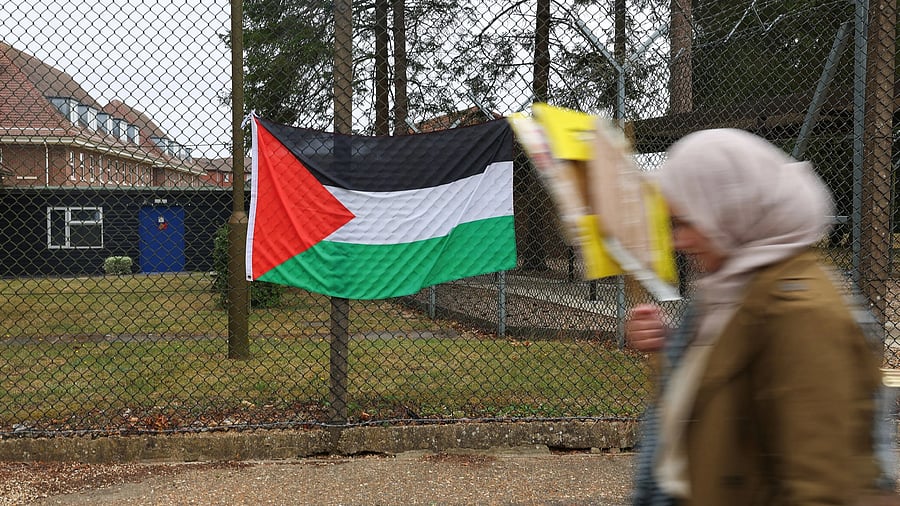
A Palestinian flag hangs on the fence of RAF High Wycombe, while demonstrators take part in a protest from the Palestine Solidarity Campaign calling for an arms embargo on Britain's weapons exports to Israel, as part of the group's Summer of Action for Gaza, in Buckinghamshire, Britain.
Credit: Reuters Photo
When European capitals moved to recognise the State of Palestine over the past year, they did something deliberately paradoxical: they affirmed Palestinian statehood while denying any legitimacy to Hamas. Spain, Ireland and Norway led in May 2024; France and the United Kingdom are set to follow in 2025, with Canada and Australia signalling similar intent.
Set against grim realities — the Hamas terror attacks of October 7, 2023, that killed 1,200 people, and Israel’s campaign in Gaza that has left more than 62,000 Palestinians dead by mid-August 2025 — recognition looks like a moral corrective. Yet it is more than symbolic. It constructs a version of Palestinian sovereignty that excludes Hamas, recentres the Palestinian Authority (PA) and edges diplomacy back towards a two-state horizon. Paradoxically, this may strengthen Israel’s long-term hand.
Recognition is political but carries legal weight. The Montevideo criteria for statehood — population, territory, government and the capacity for external relations — do not require perfect governance, only a plausible subject of international law. The UN General Assembly’s May 2024 resolution confirmed Palestine’s qualifications for membership and expanded its rights.
Yet none of this legitimised Hamas. The UN Secretary-General’s 2025 report listed the group for conflict-related sexual violence, compounding its pariah status alongside US and UK terrorism designations. The West has extended legal standing to Palestine while withholding it from Hamas, steering diplomacy towards a reformed PA under Prime Minister Mohammad Mustafa.
Wars end when veto players are contained. Israel’s war aims since Oct 2023 have been constant: destroy Hamas’ capacity and free the hostages. Recognition shifts the incentives by signalling that Palestinian statehood is not tied to Hamas.
Saudi Arabia has insisted that normalisation with Israel requires a path to Palestinian statehood. But the interlocutor envisaged for “the day after” is the PA, not Hamas. Mustafa has been explicit: the PA must govern Gaza once the war ends.
For Hamas, the choice is bleak: resist and face military assault plus political isolation, or accept a ceasefire that still delivers Gaza to a PA-led administration.
Two judicial tracks frame the conflict. The International Court of Justice has ordered Israel to comply with the Genocide Convention, halting operations in Rafah and ensuring humanitarian access. The UN has expanded Palestinian rights and urged reconsideration of full membership, even if Washington vetoed it.
Institutions bind both sides. For Israel, they impose limits on force. For Palestinians, they anchor sovereignty in institutions subject to donors and oversight. Reconstruction funds, demilitarisation benchmarks and UN participation all presuppose a responsible counterpart — the PA, not Hamas. Israel benefits when its interlocutor is tethered to international conditions rather than rockets and tunnels.
Recognition increases the reputational cost for Israel of indefinite occupation or settlement expansion. But it does so without empowering Hamas or advancing one-state campaigns. Instead, it channels diplomacy towards borders, refugees, security and Jerusalem — issues negotiable within institutions. Even Saudi normalisation, Israel’s strategic prize, now hinges on credible Palestinian statehood.
India recognised Palestine in 1988 while deepening ties with Israel. The West’s new stance harmonises with this duality: endorse Palestinian sovereignty but reject Hamas’ methods. For New Delhi, three consequences follow: 1) A rules-based pathway supports stability in West Asia, vital for energy and the diaspora; 2) Reconstruction of ports, power and health systems may open roles for Indian firms and agencies; and
3) Counter-terrorism coherence is preserved: one may back Palestinian statehood while refusing indulgence to indiscriminate violence.
Critics say Israel is boxed in: recognition hardens global expectations of withdrawal, curbs settlement ambitions and enhances accountability. True, but if the counterpart is a PA sustained by Western and Arab patronage, its incentives lean towards state-building and stability, not insurgency.
Another risk is that Hamas’ social base endures. Recognition without real sovereignty could breed spoilers. Yet Hamas’ leverage is dwindling: terrorism designations choke its funds, UN reports deepen its stigma, and Arab capitals link reconstruction and normalisation to a post-Hamas order.
Israel gains when: Hamas is excluded from diplomacy; the PA, donor-dependent and supervised, is the partner; regional normalisation rests on statehood, not militancy; and war aims are bounded by international law, where Israel’s alliances give it an edge.
In moral terms, no side “wins” after such devastation. But recognition without embrace builds a bridge: from endless war with an armed group to State-to-State bargaining.
Israel vowed in 2023 to destroy Hamas and free its hostages. Nearly two years later, that vow remains only partly fulfilled. Yet in Europe, Arab capitals and beyond, a different pledge is taking shape: Palestinian statehood must advance without Hamas.
If that pledge holds, Israel may find itself confronting not a militia beneath its borders but a constrained State beside them. Recognition is imperfect, but it aligns moral clarity with strategic design. In a region long dominated by maximalism, that alignment is no small achievement.
(The writer is a lawyer, High Court of Kerala)
Disclaimer: The views expressed above are the author's own. They do not necessarily reflect the views of DH.